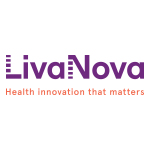Study Published in Neurology Shows Chronic Epilepsy Associated with Marker of Cardiac Electrical Instability

Study is latest in a series to suggest similar findings
LONDON–(BUSINESS WIRE)–$LIVN–LivaNova PLC (NASDAQ:LIVN), a market-leading medical technology and innovation company, today announced the publication of a new study in Neurology, which suggests that chronic epilepsy may be associated with key measures of sudden cardiac death risk.1 This is the third in a series of studies1-3 to evaluate cardiac electrical instability in patients with chronic epilepsy but the first to compare the cardiac impact of the disease among patients with chronic epilepsy to those who are newly diagnosed.
The study in Neurology evaluated established markers of sudden cardiac death risk, T-wave alternans (TWA) and heart rate variability (HRV), in patients with chronic epilepsy compared to patients with newly diagnosed epilepsy. Using data recorded on ambulatory electrocardiographic monitors, the investigators assessed whether cardiac electrical instability indicated by TWA and abnormal autonomic tone measured by HRV result from recurrent seizures. Results from the analysis showed that chronic epilepsy is associated with higher TWA levels and simultaneously with lower HRV, suggesting autonomic dysfunction or higher sympathetic tone.
“This study provides evidence indicating that, over time, some people with epilepsy may become predisposed to potentially serious heart rhythm abnormalities, due either to the effect of recurrent seizures, antiepileptic medications or other influences on the heart,” said Dr. Trudy Pang, lead study author and Assistant Professor of Neurology at Harvard Medical School. “Further work is needed to understand better the risks and the cause(s), so that we can develop more effective treatment options.”
Two previous studies in this series have shown that vagus nerve stimulation was associated with improvement in HRV and cardiac vagal tone and reduction in TWA in patients with epilepsy,2,3 making it a potential treatment for further study.
“This latest study published in Neurology further contributes to our understanding of the risk factors for sudden cardiac death in patients with epilepsy.4 The prior two studies in the series2,3 evaluated the potential for Vagus Nerve Stimulation Therapy® or VNS Therapy to reduce T-wave alternans, a well-established marker of cardiac electrical instability, in patients with drug-resistant epilepsy,” said Bryan Olin, study co-author and Senior Vice President of Clinical, Quality and Regulatory Affairs at LivaNova. “The clinical impact of this effect in terms of reducing the rate of sudden cardiac death in patients with epilepsy remains to be studied. However, results from this study may also guide development of medical therapy for both seizure reduction and cardiac protection in patients with epilepsy.”
The LivaNova VNS Therapy System is clinically proven safe and effective for the treatment of drug-resistant epilepsy for adults and children.
References
|
1 |
Pang TD, Nearing, BD, Krishnamurthy KB, Olin B, Schachter SC, Verrier RL. Cardiac electrical instability in newly diagnosed/chronic epilepsy tracked by Holter and ECG patch. Neurology 2019; 93: 450-458. |
|
|
2 |
Schomer AC, Nearing BD, Schachter SC, Verrier RL. Vagus nerve stimulation reduces cardiac electrical instability assessed by quantitative T-wave alternans analysis in patients with drug-resistant focal epilepsy. Epilepsia 2014; 55: 1996-2002. |
|
|
3 |
Verrier RL, Nearing BD, Olin B, Boon P, Schachter SC. Baseline elevation and reduction in cardiac electrical instability assessed by quantitative T-wave alternans in patients with drug-resistant epilepsy treated with vagus nerve stimulation in the AspireSR E-36 trial. Epilepsy Behav 2016; 62: 85-89. |
|
|
4 |
Bardai A, Lamberts RJ, Blom MT, et al. Epilepsy is a risk factor for sudden cardiac arrest in the general population. PLoS One 2012;7:e42749. |
Important Safety Information
About VNS Therapy® for Epilepsy
VNS Therapy is clinically proven safe and effective for the treatment of drug-resistant epilepsy for adults and children 4 years of age and older. VNS Therapy is designed to prevent seizures before they occur and stop them if they do. It is a unique treatment approach developed for people with drug-resistant epilepsy—a condition that affects one in three people with epilepsy. For more information, visit VNSTherapy.com.
INTENDED USE / INDICATIONS – UNITED STATES
Epilepsy—The VNS Therapy System is indicated for use as an adjunctive therapy in reducing the frequency of seizures in patients 4 years of age and older with partial onset seizures that are refractory to antiepileptic medications.
Commonly reported side effects are hoarseness, shortness of breath, sore throat and coughing. Side effects typically occur during stimulation and decrease over time.
See safety information at VNSTherapy.com/safety.
About LivaNova
LivaNova PLC is a global medical technology and innovation company built on nearly five decades of experience and a relentless commitment to provide hope for patients and their families through innovative medical technologies, delivering life-changing improvements for both the Head and Heart. Headquartered in London, LivaNova employs approximately 4,000 employees and has a presence in more than 100 countries for the benefit of patients, healthcare professionals and healthcare systems worldwide. LivaNova operates as two businesses: Cardiovascular and Neuromodulation, with operating headquarters in Mirandola (Italy) and Houston (U.S.), respectively.
For more information, please visit www.livanova.com.
Safe Harbor Statement
This press release contains “forward-looking statements” concerning our goals, beliefs, expectations, strategies, objectives, plans and underlying assumptions and other statements that are not necessarily based on historical facts. These statements include, but are not limited to, statements regarding VNS Therapy and our approach to treating epilepsy and heart failure using VNS Therapy. Actual results may differ materially from those indicated in our forward-looking statements as a result of various factors, including those factors set forth in Item 1A of our Annual Report on Form 10-K for the year ended December 31, 2018, as supplemented by any risk factors contained in our Quarterly Reports on Form 10-Q and our Current Reports on Form 8-K. We undertake no obligation to update the information contained in this press release to reflect subsequently occurring events or circumstances.
Contacts
LivaNova PLC Media Contact
Deanna Wilke, +1 (281) 727-2764
Director, Corporate Communications
Corporate.Communications@livanova.com

